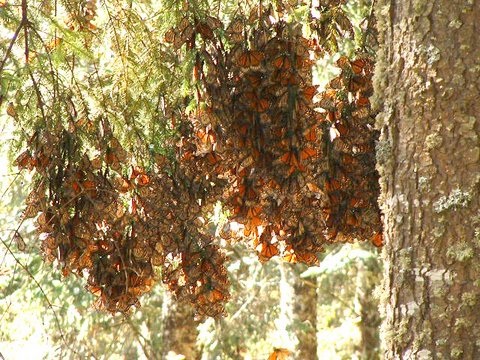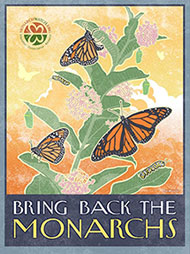Feed the monarch butterflies with Lone Star Nursery in February!
Help us feed and house the monarch butterflies–the Texas state insect–during their migration to and from Mexico. During January and February the butterflies travel back from their wintering grounds in Central Mexico and during October and November they head out on their long journey to Mexico. It takes four generations for the monarchs to reach their winter home in Central Mexico.
The butterflies only eat varieties of milkweed and lay their eggs on the plant as well. Often considered a weed, milkweed has been destroyed and GMO-seeded fields with heavy herbicides and pesticides cover the monarch’s migration pathways, leaving the butterflies nowhere to eat and live in transit. Extreme climate variations during the fall and summer also affect the butterflies’ reproduction.
 Lone Star Nursery has teamed up with Texas Farmers’ Market (Lakeline Mall & Mueller) to help these creatures on their way through Central Texas. Lone Star Nursery will offer three varieties of milkweed seedlings (available at the end of February for sale at each market) and offer advice on growing milkweed successfully. The markets will provide families free seeds and seedlings to encourage market goers to plant their own butterfly garden. Feed the monarchs events will take place at Cedar Park on Feb 22 and at Mueller on February 23.
Lone Star Nursery has teamed up with Texas Farmers’ Market (Lakeline Mall & Mueller) to help these creatures on their way through Central Texas. Lone Star Nursery will offer three varieties of milkweed seedlings (available at the end of February for sale at each market) and offer advice on growing milkweed successfully. The markets will provide families free seeds and seedlings to encourage market goers to plant their own butterfly garden. Feed the monarchs events will take place at Cedar Park on Feb 22 and at Mueller on February 23.
Help us plant a butterfly farm across Central Texas for the beautiful monarchs as they travel to and from Mexico! For more information, check out this post from Monika at Texas Butterfly Ranch, which details the situation with the monarchs. Here are some highlights:
- Only 3 million butterflies made it to Mexico this year, down from 60 million last year, and an average of 450 million in a normal year.
- Encourage monarchs in their migration through Central Texas by planting milkweed, which is a host plant for the monarchs.
- Support legislation that will ban neonicotinoid pesticides, which have a devastating effect on bees, butterflies, and other pollinators.
An organization called Monarch Watch is producing milkweed transplants for specific regions of the country and using seed that was originally sourced from each respective region and they have a wealth of knowledge available about monarchs on their website.
 Texas Farmers Market
Texas Farmers Market



Follow Bell: